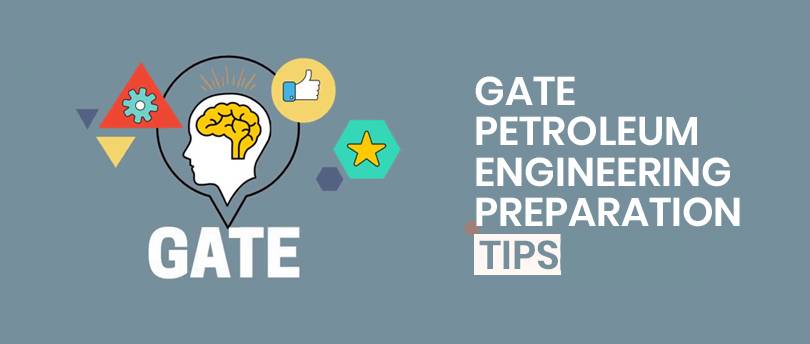
GATE is indeed one of the most competitive exams taken by engineering students, and hence it not only demands dedication but also knowledge of smart tips and tricks that can help a student gain a competitive advantage.
This year, the Graduate Aptitude Test in Engineering will be organized by IIT Guwahati. Students prepping for GATE 2021 should make themselves aware of all preparation tips, and hence, through this article, we are going to provide the same. However, this is not a generic article because the focus here will be to share tips for the GATE Petroleum Engineering, which in short, is also called GATE PE. Get some information about GATE self study.
About GATE PE Exam 2021:

The GATE PE is a branch of GATE which offers a different opportunity to engineering aspirants. It brings vetted future investment opportunities in the private business sector for the chose accredited investors. GATE PE is a comprehensive exam conducted for assessing the mathematical and verbal ability based on the petroleum subject.
This national level exam is for students who wish to enroll themselves for M.E and M. Tech programs. GATE PE is conductive every year in the month of February and it requires stringent preparation because of limited professional opportunities and the high number of aspirants taking this exam every year. There are many opportunities after gate exam
Aspirants who plan to appear for GATE PE need to be informed about the pattern of this examination, knowledge of GATE petroleum engineering, which is the basic step for segregating topics as per the GATE pattern.
Eligibility Criteria for Appearing in GATE PE:
- The aspirant should have secured a minimum of 50% in the Qualifying Degree, which can be any branch of B.E /B.Tech.
- GATE can be taken by an applicant who has completed all four years of B.E or B. Tech in Engineering.
- It can also be taken by those students who are in their final year of any engineering branch or B. E or B. Tech programs with no backlog.
- There is No Age limit for appearing in GATE PE
What to Study for GATE PE?
| S.NO. | Topics for excelling GATE PE | Important sub-topics for qualifying GATE PE |
| 1. | Numerical | non-linear algebraic equations Numerical solutions of linear. Simpson’s rule. Integration by trapezoidal. Multi-step & Single methods for numerical of differential equations |
| 2. | Petroleum Study | Petroleum exploration methods. Classification of common rocks with reference to reservoir rocks. Origin and accumulation of Petroleum. |
| 3. | Complex Variable | The polar form of a complex number Complex number Triangle inequality |
| 4. | Reservoir Study | Reservoir fluid properties Petrophysical properties of reservoir rocks, Phase behavior of hydrocarbon Fluid from porous media, Reserve estimation & techniques. |
| 5. | Petroleum Formation Evaluation | Production logging tools, Cross-plotting methods, and applications. Evaluation of CBL/VDL, USIT, SFT, RFT. Casing inspection tools, Formations micro scanner (FMS). Standard log interpretation methods. |
| 6. | Health Safety in Petroleum Industry | Personal protection system & measures. Physiological, Toxicological, Asphyxiation, respiratory troubles due to petroleum hydrocarbons, and the sour gases. Environment concepts, the harmful impact of petroleum on the Eco-system, air, water, and soil. |
| 7. | Oil Recovery Techniques | Basic principles, concepts, and Screening of EOR process. EOR methods: Thermal recoveries, Microbial EOR & Chemical flooding. Miscible flooding and permeability heterogeneity. |
| 8. | Latest Trends in the PE | shale gas, heavy oil, oil shale, Coal bed methane, gas hydrate, |
| 9. | Oil Testing | Diffusivity equation, Radius of investigation, Horner’s approximation, Principle of superposition, Drill-Stem Testing, Multilayer reservoirs, build up-test analysis, Pressure Transient Tests, Wellbore effects, Injection well testing, Pulse testing, Multiple well testing, Interference testing. |
| 10. | Offshore production practice | Offshore oil operations, offshore mobile units, offshore fixed platforms, Offshore drilling, jack-up, ships., conductors and risers, offshore well digging, subsea technology, Offshore production, Station keeping: mooring & dynamic positioning system, |
| 11. | Differential equations | First order equations. Cauchy’s equation. Euler’s equations. Boundary value problems. Equations with constant coefficients, Laplace transforms, Solutions of wave equations |
| 12. | Mathematical: Calculus | Surface and Volume integrals, Functions of a single variable, Mean value theorems, Taylor series, Evaluation of definite and improper integrals, Maxima and Minima, Total derivative and Partial derivatives, Vector identities, Gradient, Divergence and Curl, Directional derivatives, Line. |
| 13. | Algebra: Linear | Systems of linear equations, Matrix algebra, Eigen and eigenvectors. |
| 14. | Probability | About probability and the sampling theorems, Mean, median, mode, Conditional probability, and standard deviation. Normal and Binomial distributions, Random variables, Linear regression analysis. |
| 15. | Production Process of Petroleum | Well completion, operation, production and mitigation problems. Workover & completion fluids, Field processing of oil & gas, Well stimulation techniques Well servicing & Workover operations, Formation damage, Artificial lift techniques, transportation of petroleum and petroleum storage, Production testing, Nodal system analysis, Metering and measurements oil & gas, |
| 16. | Reservoir Science | Reservoir fluid properties, Reservoir pressure measurements, Reservoir drives, Reserve estimation & techniques. |
Study Plan for Qualifying GATE PE within 6 Months
If you have six months left for appearing in the GATE PE, here’s the study plan you need to include in your study routine. Stick to the plan on a regular basis, be honest with yourself, and be attentive to every minute detail.
| Subject | Allocated Time |
| General Aptitude | 1 Hour Daily |
| Subject Questions | 2 Hours Daily |
| Engineering Mathematics | 1 Hour Daily |
Study Plan for Qualifying GATE PE within 3 months
If you have only three months left for appearing in the GATE PE, here’s the study plan you need to include in your study routine. Stick to the plan on a regular basis, be honest with yourself, and be attentive to every minute detail.
| Subject | Allocated Time |
| General Aptitude | 2 Hour Daily |
| Subject Questions | 4 Hours Daily |
| Engineering Mathematics | 2 Hour Daily |
What are the Books you Need to Study for Qualifying GATE PE?

| S.No. | Reference Books | Authors |
| 1 | Petroleum Formation Evaluation | Edward J.Lynch, |
| 2 | Applied Geophysics | Telford, W.M, Geldart, |
| 3 | Wellsite Geological Techniques for Petroleum Exploration: | Bhagwan Sahay |
| 4 | Handbook of Petroleum and Natural Gas Engineering | William C Lyons |
| 5 | Elements of Petroleum Geology | Richard C. Selley |
| 6 | Geology Of Petroleum | A.I. Leverson |
GATE PE Books Recommended by Toppers
| S.No. | Reference Books | Authors |
| 1 | Engineering Maths | MADE EASY GATE Engg. Maths book |
| 3 | Formation Evaluation | Heriot-Watt and SLB Openhole Logs |
| 5 | Well Testing | Tarek Ahmed & McKinney and J. Lee |
| 7 | Exploration, EOR, Offshore, HSE, Latest trends | IIT (ISM) proof. notes provided on GATE AIOTS PE website |
| 9 | Petroleum Production Operations | Heriot-Watt Publication |
| 11 | Surface production operation (vol. 1 &2) | Ken Arnold |
Golden Tips for Cracking the GATE PE:

Before we delve deep into the specifics, let us share with you the basics of preparing for GATE petroleum engineering. Here are the six golden rules every GATE PE aspirant should swear by if they aspire to qualify the exam:
- Have a thorough knowledge of your GATE PE exam syllabus: This is the first step or preparing for any GATE exam. Through the syllabus, you know which topic carries significant weightage that can have an impact on your final score.
- Select the best reference books for the GATE PE: This is an obvious step, and yet the most crucial. You’ve to know which book you can study to nail the exam. Before buying the book, consider the readability, credibility, and language ease as the main factors.
- Prepare a Study Plan: Most of the students create a study plan but fail to stick to it, and that is what filters them from those who succeed in the GATE. Hence, besides preparing a study plan, ensure you stick to it and work on your plan diligently.
- Prepare your own notes: Preparing self-written notes is the key steps to clearing the hardest of the competitive exams since it helps in both clearing the concepts and also helps the student memorize important points.
- Practice the Previous Year Question Papers: Again, it’s the basic step. Practice makes a man perfect- the same rule is applicable here as well. So, gather the last ten year’s question paper, analyze the important subjects, and practice the parts where you’re not good at.
- Practice the Mock Test Papers: Mock tests follow the pattern same as the previous year paper, and the questions that are likely to appear in the next year exam. This makes mock papers the best sets of questions to practice before taking the GATE. You can checkout some tips to crack GATE exam
Over to You Now
The above-listed syllabus, recommended books, study plan, and tips are more than enough for any student to qualify the GATE PE. Exams like GATE demand hard work, but more than that, it demands a student to work hard, consistently. Hence, it is crucial to stick to your study routine, no matter what. Most of the students create a study plan but fail to stick to it, and that is what filters them from those who succeed in the GATE.
Hence, besides preparing a study plan, ensure you stick to it and work on your plan diligently. Practice makes a man perfect- the same rule is applicable here as well. So, gather the last ten year’s question paper, analyze the important subjects, and practice the parts where you’re not good at.
ARC Foundation is one of the best GATE coaching centres in Kochi. We have a legacy of training aspiring candidates to help them crack GATE and CAT examinations.



 comments 0
comments 0
